Saturday, December 23,2023. Annette’s News Roundup.
I think the Roundup makes people feel not so alone.
To read an article excerpted in this Roundup, click on its blue title. Each “blue” article is hyperlinked so you can read the whole article.
Please feel free to share.
Invite at least one other person to subscribe today! https://buttondown.email/AnnettesNewsRoundup
____________________________
Joe is always busy.
Jill and I had the honor of spending the afternoon at Children's National Hospital reading with some of the strongest kids and parents there are.
— President Biden (@POTUS) December 23, 2023
Our hearts are with them this Christmas. pic.twitter.com/Y8agyZSxXS
Biden extends marijuana pardons to convictions on federal lands, Washington, D.C. https://t.co/2L75Uriy1u
— POLITICO (@politico) December 22, 2023
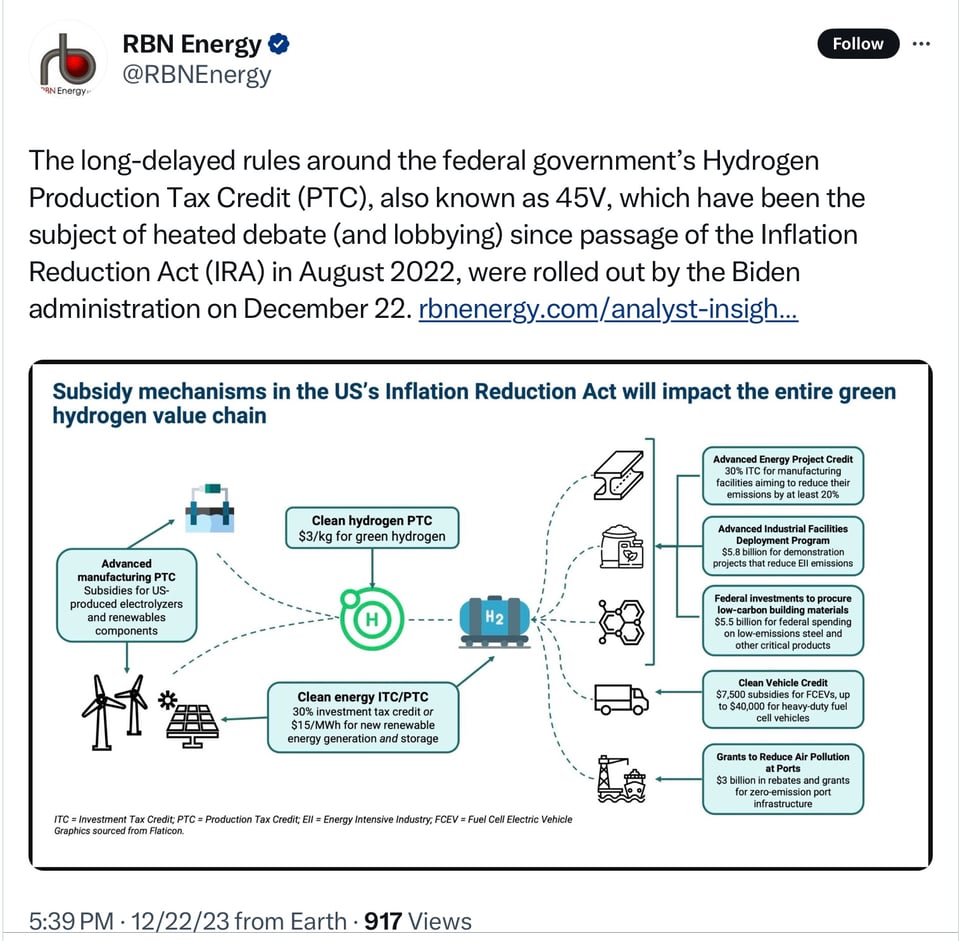
____________________________
The Supreme Court acts in Trump’s favor.
Trump wanted the January 6 case slowed down. So it will be.
As the Times reported, “The case will instead first be heard by a federal appeals court, which has put it on a fast track, scheduling arguments for Jan. 9.”
And as The Times wrote, “Any significant delays could plunge the trial into the heart of the 2024 campaign season or push it past the election.” (Source. NY Times).
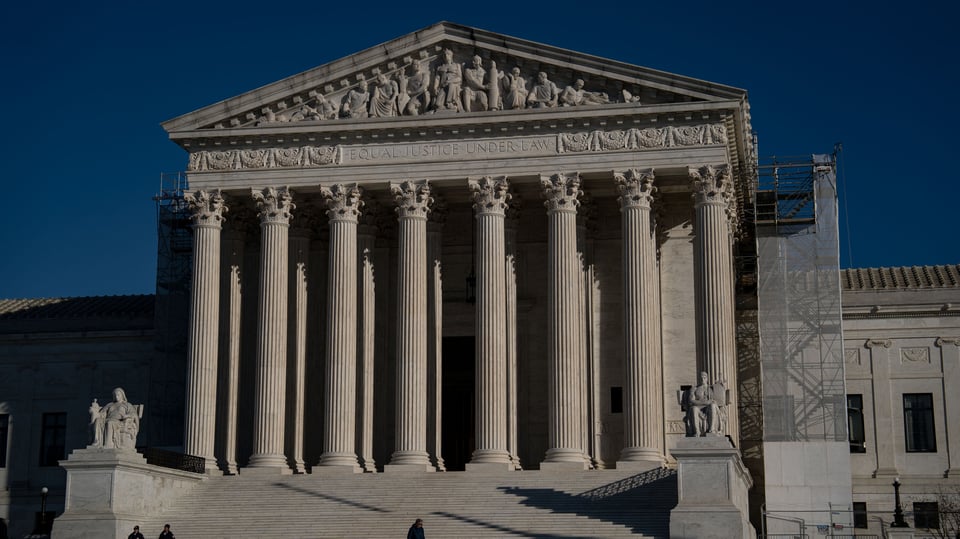
Supreme Court Won’t Hear Case on Trump’s Immunity Defense for Now.
The Supreme Court declined on Friday to decide for now whether former President Donald J. Trump is immune from prosecution on charges of plotting to overturn the 2020 election.
The decision to defer consideration of a central issue in the case was a major practical victory for Mr. Trump, whose lawyers have consistently sought to delay criminal cases against him around the country.
The case will now move forward in an appeals court, which has put it on a fast track, and most likely return to the Supreme Court in the coming weeks or months.
The order issued Friday was one sentence and gave no reasons, which is typical when the justices deny review. There were no noted dissents.
Jack Smith, the special counsel prosecuting Mr. Trump, had asked the justices to move with extraordinary speed, bypassing the appeals court.
“This case presents a fundamental question at the heart of our democracy: whether a former president is absolutely immune from federal prosecution for crimes committed while in office or is constitutionally protected from federal prosecution when he has been impeached but not convicted before the criminal proceedings begin,” Mr. Smith wrote.
A speedy decision by the justices was of the essence, Mr. Smith wrote, because Mr. Trump’s appeal of a trial judge’s ruling rejecting his claim of immunity suspended the criminal trial. The proceeding is scheduled to begin on March 4 in Federal District Court in Washington, though Friday’s development made a postponement more likely.
Any significant delays could plunge the trial into the heart of the 2024 campaign season or push it past the election, when Mr. Trump could order the charges be dropped if he wins the presidency.
“The United States recognizes that this is an extraordinary request,” Mr. Smith wrote of his request to skip review in the appeals court. “This is an extraordinary case.”
The appeals court, the U.S. Court of Appeals for the District of Columbia Circuit, has put the case on a brisk schedule, ordering expedited briefing and scheduling arguments for Jan. 9.
The case will be heard by a three-member panel made up of Judge Karen L. Henderson, who was appointed by President George H.W. Bush, and Judges Florence Y. Pan and J. Michelle Childs, who were both appointed by President Biden.
The panel will probably issue a prompt decision. If Mr. Trump loses, he could ask the full appeals court to rehear the case. In the end, the losing side will in all likelihood return to the Supreme Court.
The trial judge, Tanya S. Chutkan, rejected Mr. Trump’s sweeping claims that he had “absolute immunity” from the election interference indictment because it was based on actions he took while in office. She has since suspended proceeding in the case while an appeal moves forward.
Mr. Smith, citing the Nixon tapes case, urged the justices to move fast: “The public importance of the issues, the imminence of the scheduled trial date and the need for a prompt and final resolution of respondent’s immunity claims counsel in favor of this court’s expedited review at this time.”
Mr. Trump’s lawyers took the opposite view, asking the justices to follow the usual procedure by letting the appeals court consider the matter first.
“Importance does not automatically necessitate speed,” Mr. Trump’s brief said. “If anything, the opposite is usually true. Novel, complex, sensitive and historic issues — such as the existence of presidential immunity from criminal prosecution for official acts — call for more careful deliberation, not less.”
Mr. Smith called that approach misguided.
“The public interest in a prompt resolution of this case favors an immediate, definitive decision by this court,” he wrote. “The charges here are of the utmost gravity. This case involves — for the first time in our nation’s history — criminal charges against a former president based on his actions while in office.”
“And not just any actions: alleged acts to perpetuate himself in power by frustrating the constitutionally prescribed process for certifying the lawful winner of an election,” Mr. Smith added.
Mr. Trump’s lawyers countered that the case, and the desire to resolve it promptly, was driven by political considerations.
“He confuses the ‘public interest’ with the manifest partisan interest in ensuring that President Trump will be subjected to a monthslong criminal trial at the height of a presidential campaign where he is the leading candidate and the only serious opponent of the current administration,” the brief said.
The two sides rely on precedents that point in opposite directions, both involving President Richard M. Nixon.
In 1974, in United States v. Nixon, the court ruled that Nixon, then still in office, had to comply with a trial subpoena seeking tapes of his conversations in the Oval Office, rejecting his claims of executive privilege.
“Neither the doctrine of separation of powers, nor the need for confidentiality of high-level communications, without more, can sustain an absolute, unqualified presidential privilege of immunity from judicial process under all circumstances,” Chief Justice Warren E. Burger wrote.
Eight years later, in Nixon v. Fitzgerald, the court voted 5 to 4 in favor of Nixon in a civil case brought by an Air Force analyst who said he was fired in 1970 in retaliation for his criticism of cost overruns. By the time the court acted, Nixon had been out of office for several years.
“In view of the special nature of the president’s constitutional office and functions,” Justice Lewis F. Powell Jr. wrote for the majority, “we think it appropriate to recognize absolute presidential immunity from damages liability for acts within the ‘outer perimeter’ of his official responsibility.”
The Supreme Court will soon confront a different question arising from the aftermath of the 2020 election. On Tuesday, the Colorado Supreme Court ruled that Mr. Trump is not eligible to be on the primary ballot in that state under a provision of the Constitution that bars officials who have engaged in insurrection from holding office. Mr. Trump has said he will appeal that ruling to the Supreme Court. (New York Times).
____________________________
Colorado said Trump may not run there. Will Maine be next?
Maine’s Secretary of State to Decide Whether Trump Can Stay on Ballot.
Shenna Bellows, a Democrat, has said she would decide next week whether Maine will join Colorado in disqualifying former President Donald J. Trump from its primary ballot.
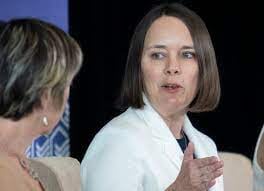
Maine’s secretary of state is poised to issue a decision next week that could bolster a citizen-led movement to keep former President Donald J. Trump off primary ballots around the country — or contradict a landmark court decision in Colorado this week.
In a hearing last week at Maine’s State House in Augusta, Shenna Bellows, the secretary of state, weighed three separate complaints challenging Mr. Trump’s eligibility to appear on the state’s Republican primary ballot. Two are based on the same section of the Constitution that the Colorado Supreme Court cited in its 4-to-3 decision on Tuesday that found Mr. Trump cannot hold office again because his actions leading up to the Jan. 6, 2021, attack on the Capitol amounted to engaging in an insurrection.
Some form of challenge to Mr. Trump’s eligibility has been lodged in more than 30 states, but many of those have already been dismissed. Most are unfolding in the courts, but in Maine — because of a quirk in its Constitution — the secretary of state weighs in first, with voters filing petitions, not lawsuits. Her decision can then be appealed to the state’s Superior Court.
The Colorado ruling was the first in history to disqualify a presidential candidate from a ballot under the 14th Amendment, which was drafted after the Civil War. One section of the amendment bars those who have taken an oath “to support” the Constitution from holding office if they “engaged in insurrection or rebellion against the same,” or had “given aid or comfort to the enemies thereof.”
Mr. Trump’s campaign has said it will appeal the decision to the U.S. Supreme Court; should the high court take the case, the other challenges around the country are likely to be put on hold.
After the Colorado ruling, Ms. Bellows, an elected Democrat, invited lawyers on both sides in Maine to file supplemental briefs and said that her decision was likely to come next week.
The Republican primaries in Maine and Colorado are both scheduled for March 5, known as Super Tuesday because so many states hold primaries that day. But states have to start sending ballots to service members and overseas voters 45 days before a federal election — Jan. 20, in the case of the March 5 primaries — adding urgency to the situation.
If the Supreme Court agrees to hear Mr. Trump’s appeal, the Colorado court’s decision would not take effect on Jan. 4 as scheduled, and Mr. Trump would remain eligible to appear on the ballot there pending the outcome of the appeal, according to Colorado state officials.
An appeal would also probably pause other efforts to keep him off ballots around the country. But it was unclear this week what it would mean in Maine, where the process is thus far proceeding outside the courts.
Under Maine law, registered voters can challenge a candidate’s ballot access by filing a petition with the secretary of state. The state received three such challenges to Mr. Trump’s ballot eligibility: one from a group of former elected officials, and two from individual residents.
Mark Brewer, the chairman of the political science department at the University of Maine, said little attention had been paid to the complaints in Maine until the ruling in Colorado.
“Now everyone is looking to see where else this might happen,” he said.
The challenge in Michigan is also among those being closely watched. Lawyers on both sides have asked the state’s Supreme Court to rule by next week, but the court could schedule oral arguments first, or wait to see if the U.S. Supreme Court rules on the Colorado case.
Similar lawsuits filed by a long-shot Republican presidential candidate, John Anthony Castro, have been dismissed by federal judges in Rhode Island, New Hampshire and Florida, and withdrawn in a dozen other states.
Sworn in almost three years ago as Maine’s first woman secretary of state, Ms. Bellows grew up in tiny Hancock, Maine, and served two terms as a state senator. She is the former executive director of the nonprofit Holocaust and Human Rights Center of Maine and of the American Civil Liberties Union of Maine.
Dr. Brewer said he could not predict her decision, but noted that in her shoes, he would find it hard to rule as Colorado’s court did.
“Whatever you may think he’s done, the former president has not been charged with insurrection,” Dr. Brewer said in an interview. “Even if he had been charged, he hasn’t had his day in court yet, so in the eyes of the law, he’s not guilty of anything.”
But Ethan Strimling, a former mayor of Portland and Democratic state legislator who initiated one of the challenges with two former Republican state legislators, said the Colorado court decision changes that equation.
“There is no longer any truth to that argument, because two courts have now found that he incited insurrection,” Mr. Strimling said, referring to the Colorado Supreme Court ruling and one from a lower court that preceded it. “I think that creates great clarity.”
Lawyers for Mr. Trump argued in their follow-up brief that the Colorado decision should be irrelevant to the Maine proceeding because the two challenges are separate actions under different laws and standards, and because the former president did not have “full and fair opportunity” to litigate the facts in Colorado.
Furthermore, they reiterated, the secretary of state does not have legal standing to exclude Mr. Trump from the Maine ballot.
“The Constitution reserves exclusively to the Electoral College and Congress the power to determine whether a person may serve as president,” they argued in a closing brief last week. “The challengers effectively ask the secretary to strip those institutions’ power to resolve Section Three issues.”
While two of the three challenges in Maine focus on the 14th Amendment, the third, brought by Paul Gordon, a lawyer in Portland, argues that Mr. Trump should be found ineligible for the ballot under the 22nd Amendment, which says that “no person should be elected to the office of president more than twice.” The basis for his argument is that Mr. Trump has repeatedly claimed to have won the 2020 election.
Mr. Trump could “remove this obstacle” to qualify for the ballot, Mr. Gordon said in his complaint, by “acknowledging that he lost the 2020 election and repudiating all previous statements undermining the integrity of that election.” (New York Times).
____________________________
Gerrymandering in Wisconsin will soon end. Wisconsin is going to have new election maps, the fair kind.
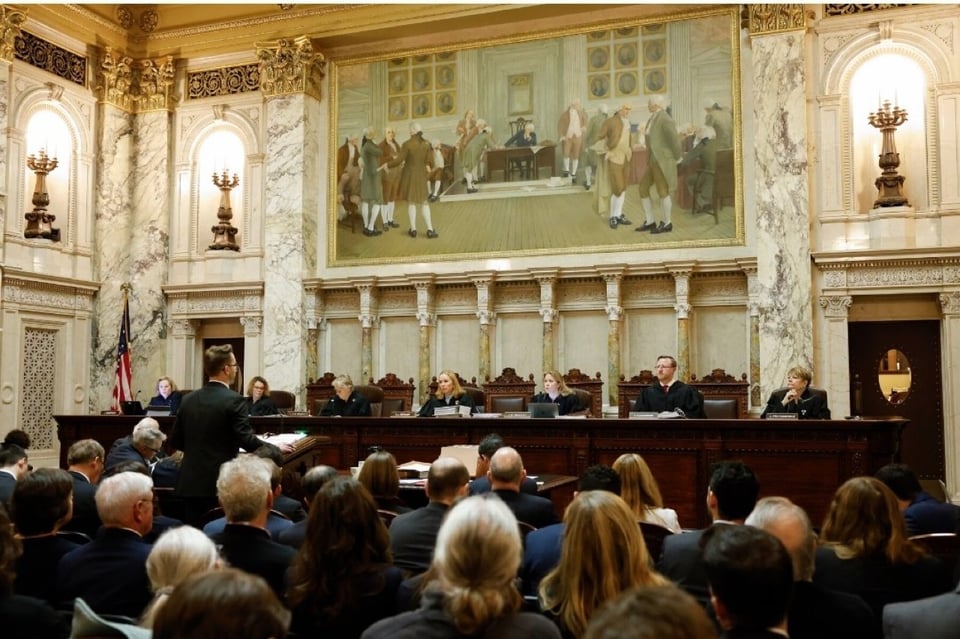
🚨BREAKING: Wisconsin Supreme Court STRIKES DOWN legislative maps and orders new maps in time for 2024 elections. If GOP legislature and Dem Gov cannot enact new maps, court will draw. Congrats to the lawyers involved.
— Marc E. Elias (@marceelias) December 22, 2023
A huge win for democracy!https://t.co/0Zy4JLRRpe pic.twitter.com/h2aMLG8mpb
My statement regarding the Wisconsin Supreme Court’s decision in Clarke v. WEC. ⬇️ pic.twitter.com/ewSSLe6yAW
— Governor Tony Evers (@GovEvers) December 22, 2023
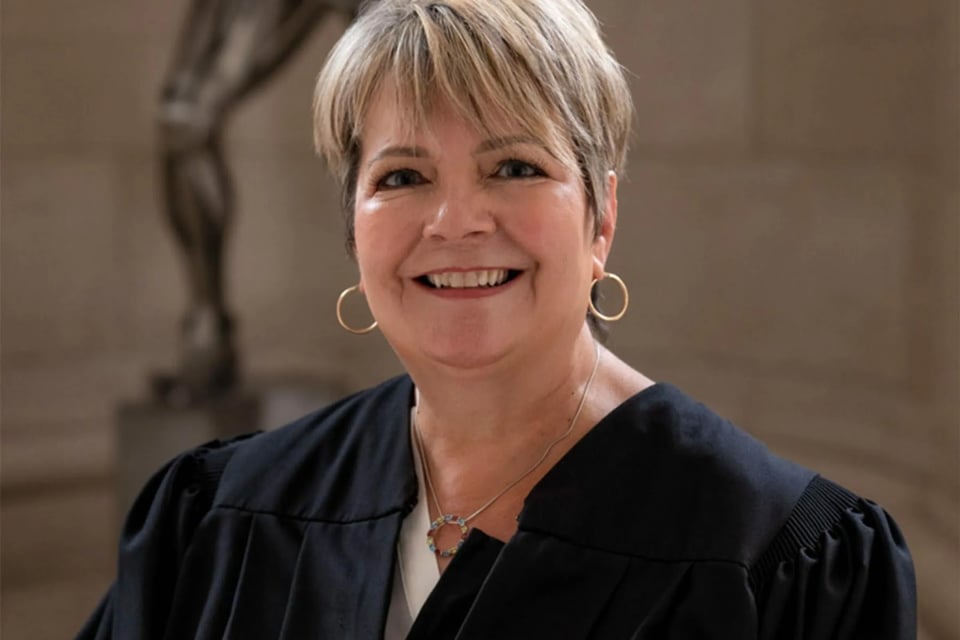
Wisconsin voters elected Judge Janet Protasiewicz to the Wisconsin Supreme Court. Her vote yesterday may have ended Gerrymandering in Wisconsin.
____________________________
In case you ever wonder if there is any there there to GOP noise about Hunter Biden, this article should free you of such thoughts.
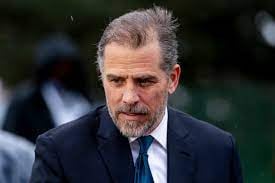
Assessing 6 Claims by the G.O.P. in the Biden Impeachment Inquiry.
Many messages cited by Republicans as evidence of corruption by President Biden and his family are being presented out of context.
As they search for evidence they can use to impeach President Biden, House Republicans have repeatedly pointed to evidence that they say undercuts his claims that he never had anything to do with the foreign business dealings of his son, Hunter Biden.
As vice president, for example, Mr. Biden did briefly meet with some of his son’s business associates, though there is no testimony that he had any substantive discussions with them or that he changed government policy to benefit any of Hunter Biden’s ventures.
Still, Republicans have continued to mine voluminous records related to Hunter Biden, including a trove of messages from a computer hard drive, to try to make a case that Hunter Biden’s income from abroad was at the heart of an influence-peddling operation that enriched the entire Biden family, including his father.
Republicans have used quotes culled from text messages or emails to add a confessional quality to their presentations — evidence, they say, that Hunter Biden was essentially admitting that he and his father were engaged in political corruption.
But an examination of some of the highest-profile examples cited by Republicans shows that they have been taken out of context, or that Republicans have omitted key messages in email or text chains that often cast the communications in a more innocuous light.
‘Half my salary’
In one example, Republicans point to a 2019 text message Hunter Biden sent to his daughter in which, they say, he confesses to sharing half of the millions he received from overseas business deals with his father.
“I Hope you all can do what I did and pay for everything for this entire family Fro 30 years,” he wrote in the typo-filled message. “It’s really hard. But don’t worry unlike Pop I won’t make you give me half your salary.”
Rather than referring to money Hunter Biden received from the Ukrainian energy company Burisma or from a venture with a Chinese partner, Hunter Biden was alluding to his financial support for his own children and his school days, when his father allowed him to keep half the paycheck from part-time jobs but asked that he turn over the other half to help pay for room and board, according to a review of Hunter Biden’s messages and interviews by The New York Times.
‘10 percent for the big guy’
The phrase “10 percent for the big guy” is almost ubiquitous in Republican circles, stemming from the accusation that Hunter Biden gave his father a 10 percent stake in his business deals.
It originates from a 2017 email sent by James Gilliar, a business associate of Hunter Biden’s, who proposed including the “big guy” — presumably Joseph R. Biden Jr., the former vice president — in a business venture under the name Oneida Holdings.
“10 held by H for the big guy?” Mr. Gilliar wrote.
But he told The Wall Street Journal in 2020 that his suggestion never went anywhere. The former vice president did not get involved with their business, and the proposed deal never produced any profit for anyone to split.
“I would like to clear up any speculation that former Vice President Biden was involved with the 2017 discussions about our potential business structure,” Mr. Gilliar said in 2020. “I am unaware of any involvement at any time of the former vice president. The activity in question never delivered any project revenue.”
In an interview with the F.B.I., Rob Walker, Hunter Biden’s former business partner, described suggestions of getting Hunter’s father involved with the business as “wishful thinking.” He stated he “certainly never was thinking at any time that the V.P. was a part of anything we were doing.”
‘I can work with you father alone !!’
Another message Republicans have highlighted is a 2018 text sent from James Biden, the president’s brother, to Hunter Biden, who at the time was in the throes of addiction to alcohol and crack cocaine: “I can work with you father alone !! We as usual just need several months of his help for this to work.”
At a House Oversight Committee hearing, Republican lawmakers implied this message was in reference to business dealings, but another text in the chain makes clear James Biden was referring to working with Joe Biden to get help for Hunter Biden as he struggled to keep up with his bills, get sober and find a place to live.
Concerns of a bank investigator
Republicans have also drawn attention to the concerns of a bank investigator about Hunter Biden’s business activities, which involved securing millions of dollars from a Chinese firm in exchange for work the investigator flagged as potentially nonexistent.
“The activity on the account appears unusual with no current business purpose,” the investigator wrote.
But Republicans omitted other emails in the chain that were later released by Democrats on the Oversight Committee. They show a robust debate inside the bank about the legitimacy of the business activity. One response described the activity connected to Hunter Biden’s account as “reasonable and consistent with the business profile.”
$240,000 to Joe Biden
Despite assertions that anywhere from 10 percent to half of the money from Hunter Biden’s business deals went to his father, Republicans have failed thus far to show any profit for the current president.
They have documented three instances in which family members paid money to Joe Biden — while he was not in office — but they have often omitted the context that the exchanges were loan repayments, not a cut of income.
Rather than showing Joe Biden was enriched by his family’s foreign business dealings, the documents released by House Republicans so far have showed the opposite.
After leaving the vice presidency, Joe Biden made more than $15 million, mostly through speaking engagements and book sales, some of which went to support his extended family.
By contrast, Hunter Biden spent much of his money on alcohol, drugs, prostitutes, fancy cars and other self-indulgent expenses and failed to pay his taxes on time, resulting in his federal indictment this month on tax charges.
James Biden also found himself from time to time in need of a loan. According to House Republicans, at one point, James Biden had just $46 in a personal account.
House Republicans have pointed to two payments — one for $200,000 and another for $40,000 — James Biden made to Joe Biden while he was not in office. They have characterized the $40,000 check as “laundered China money.” But they did not note evidence showing Joe Biden had first loaned money to his brother before being repaid.
The House Oversight Committee has also released documents that showed that one of Hunter Biden’s businesses, Owasco PC, made three payments of $1,380 to Joe Biden in 2018. But other documents indicate the money was to pay back his father for helping to cover the cost of a Ford truck.
‘I am sitting here with my father’
One WhatsApp message that has received much attention was provided by an I.R.S. investigator who testified before Congress under whistle-blower protections. In it, Hunter Biden invoked his father, who was then out of office, while pressing a potential Chinese business partner in 2017 to move ahead with a proposed energy deal.
“I am sitting here with my father and we would like to know why the commitment has not been fulfilled,” the message states. On its face, the message seemed to suggest Joe Biden was in league with his son pressuring for a payment to the family.
But Democrats have argued it is more likely an example of Hunter Biden’s bluster than an accurate statement of Joe Biden’s involvement in a shakedown. A lawyer for Hunter Biden says he does not remember sending the message.
The president has denied he was present at the time. (New York Times).
Trump is emboldened, maybe by the Supreme Court’s action today (see above),maybe by Judge Cannon officiating at the documents case.
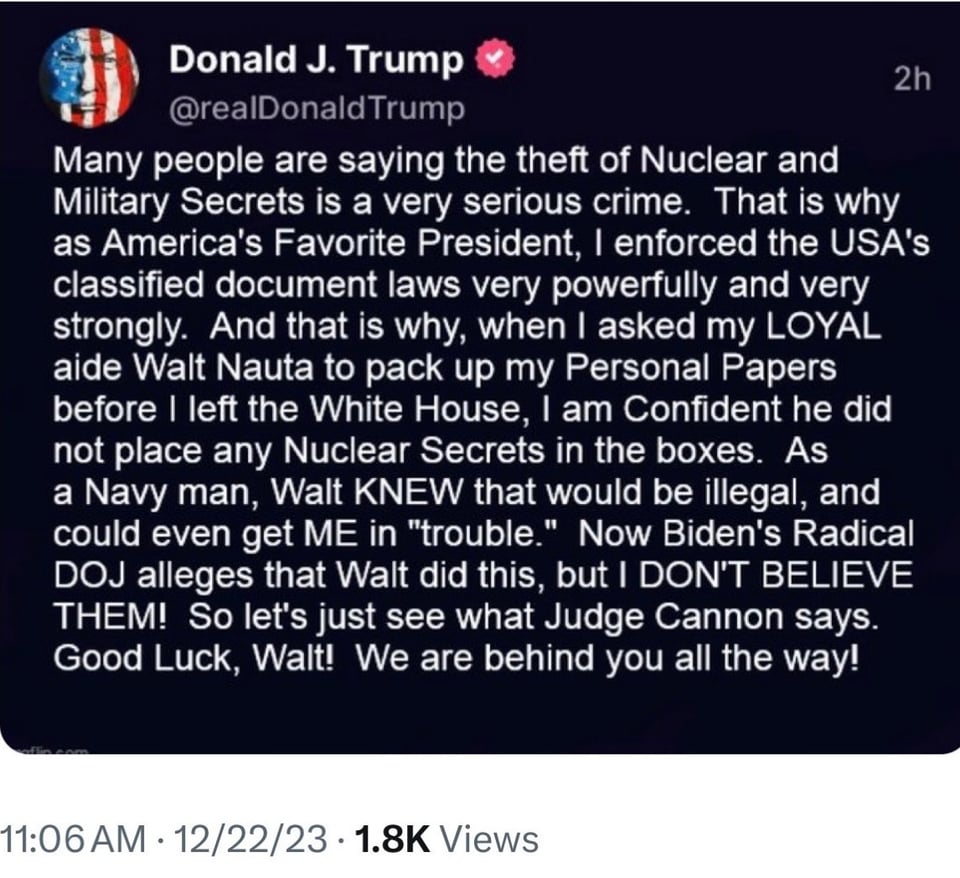
____________________________
Custom made by Tulane students, mobility chairs help special needs toddlers get moving - ABC News.
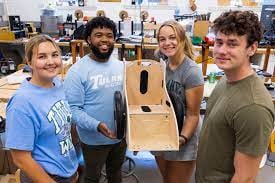
This photo released by Tulane University shows Tulane biomedical engineering students building specially designed mobility chairs for children at the MakerSpace workshop at the university Sunday, Sept. 24, 2023. The students are making the second batch of mobility chairs for toddlers, that will eventually go to pediatric patients at Children's Hospital. Wheelchairs are expensive, and insurance won't cover the cost for children unless the child proves they can operate it independently. (Sabree Hill/Tulane University via AP)
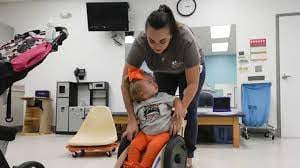
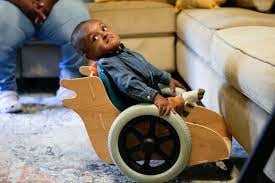
NEW ORLEANS -- At 19 months old, Elijah Jack, born with no femur bone in one leg and a short femur in the other, is unable to walk on his own like most toddlers his age. Another 19-month-old, Freya Baudoin, born prematurely at 28 weeks and delayed in her mobility, has finally taken her first step.
Special needs children like these often take longer than most to become independently mobile, which can be a hardship for parents and others who care for them. Elijah is often carried because of his limb difference and clubfeet, meaning that instead of being straight, his feet are twisted inward and his toes point downward.
As a result, getting around on his own is a challenge.
That was until this past Spring. Elijah was one of the first recipients of a specially designed rolling chair built by a team of biomedical engineering students at Tulane University. Today, Elijah has mastered getting around on wheels – turning, stopping and steering all on his own.
“He loves his chair,” said Crystal Jack, Elijah’s mom. “So, I get a lot of things done because I know in his chair, he's safe. He know how to go around the house with it and everything, so I get a lot of things done now."
Before the chair, Jack said her son was able to scoot on the floor to get where he needed to go but the chair offers a whole new level of independence.
"Like I said we come a long way, but I’m blessed to have him,” Jack said, smiling warmly as he moved back and forth around the living room of her mother’s home in Ventress, Louisiana.
The Tulane students partnered with the nonprofit MakeGood in 2022 to design and produce the chairs to help toddlers (roughly ages 1-4) build independence and strength, and for some, prepare for a real wheelchair. While it remains difficult to access precise numbers for total wheelchair use among children, there were about 2.8 million wheelchair users in the U.S. in 2002, of whom 121,000 were under 15 years of age, according to the US Census.
MakeGood is the New Orleans area coordinator for TOM Global, an Israeli nonprofit that combines modern design and digital manufacturing to fulfill neglected needs of people with disabilities and limitations. TOM stands for Tikkun Olam, which is Hebrew for “repairing the world.”
The students partnered with the nonprofits as part of a service-learning project — a graduation requirement at Tulane. But many say they had no idea when the project started the depth of impact their chairs would make in the lives of children in the community.
Dylan Lucia, a graduate student at Tulane from the San Diego, California area, said he chose the field of biomedical engineering to help people and this project has manifested that.
“Seeing that direct kind of patient feedback and seeing how much these (chairs) were improving their lives and helping them become a more independent person, even as a small toddler ... like, it was really, really endearing to see something like that and to see the positive change,” Lucia said.
The chairs are particularly helpful for families whose children will eventually need wheelchairs. Noam Platt, director of MakeGood, said insurance companies typically don’t cover the cost of a wheelchair for a child unless there is sufficient evidence that the child can use it effectively.
“These devices are used to create that evidence that their quality of life will be improved so they can get maybe a more durable assistive technology,” Platt said.
Freya's chair was one of five made throughout several weekends early this fall at Tulane’s Scot Ackerman MakerSpace, an enormous workshop with laser cutters, 3D printers and drilling and sewing equipment.
Students applied padding and safety straps to the chairs, and some required modifications to accommodate the needs of the children receiving them. For instance, Freya’s chair needed a wider strap to help secure her torso, and another patient needed a space behind the chair big enough to hold his breathing vent. Freya’s chair also had a bar added to the back, so that she could push it like a stroller. She took her first steps in early December after working with her physical therapist and her chair.
There's no word on how long Freya will have to use the chair but her mother said it has been more than a blessing.
“At first, we thought the muscle tone in her ankles wasn't strong enough for her to walk at all, but the neurologists recently told us everything is looking good and she should be walking on her own or with limited assistance soon,” said her mom, Heather Hampton, of Metairie, Louisiana.
Hampton said Freya's able to push the chair like a stroller on her own. She wishes they could've gotten it sooner but understands the adjustments that needed to be made.
“We're just happy that she'll ultimately be able to get around and walk independently,” Hampton said.
Platt said the mobility chairs' original design and plans came from TOM Global but the parts were purchased in the U.S. or made and then assembled by hand at Tulane. The wood panels used for the chair’s frame were laser cut and then sanded by students to buff out any splinters and rough edges. Padded seats were stuffed into fabric cushions sewn by students. Wheels were purchased online and then screwed into place.
Elijah has had his chair since the end of March. It was made in the first batch of about 10 chairs delivered to pediatric patients for use in occupational and physical therapy sessions.
"His chair shows him that, like, ‘I could be up like other children.’ You know, he don’t let his (being) disabled get in the way," said Jack who added Elijah will likely need some type of mobility assistance for the rest of his life.
Bumpers were added to the bottom front of the most recent batch of chairs after parents from the first round said their furniture – and feet – were taking hits as their children became better and faster at using their chairs.
Platt said there have been two rounds, so far, of chair building and 15 chairs have been given away. But, he said they're aiming for at least 10 to 15 more by Spring 2024.
“We coordinate with our clinical partners to find kids that would be a good fit for these devices,” he said. “We work with the clinical team to make sure each chair fits the individuals and make customizations if necessary.”
Platt said the chairs cost less than $200 each to make, and even though these chairs were donated to patients at no cost, the price is still much lower than most pediatric wheelchairs on the market and electric-powered wheelchairs can run into the thousands.
The student-made chairs also look and feel more like toys than hospital equipment, Platt said. They’re made to be light and easy to maneuver.
Platt said he’d ultimately like to see the chairs be made in high schools and colleges across the country.
“For the students that I work with, I tell them this is just the beginning," Platt said. "I’m trying to open their eyes to kind of a lifelong passion that they’ll have to solving these problems because once you see the problems, you see the scope of the problems and you can’t really ignore them.” (ABC News - source AP).
____________________________
The Roundup is going to be on winter solstice hiatus until December 26. Will you miss it? Feel free to write to tell me.

A Merry Christmas to all.
____________________________